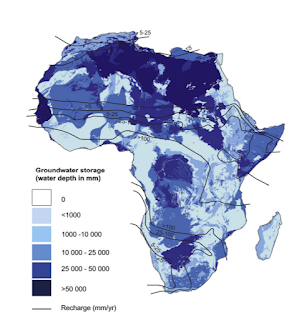Dams for Africa: Damage or Power?
Like no other transboundary river basins, the Nile struggles to maintain a balance of water supply.
60 percent of the African
population resides within a transboundary river basin (Nijsten et al., 2018)
where conflicts arise over who has the political rights and terrestrial sovereignty
to the access of water resources. In this blog, I will be investigating water
in Africa, particularly the effects of dam construction on food production, and understanding the impacts of transboundary water use.
Like no other transboundary river basins, the Nile struggles to maintain a balance of water supply. The Blue Nile is a transboundary river basin between Ethiopia and Sudan, it is a major water contributor to the River Nile and encompasses countless hydropower dams (Basheeret al., 2018). Construction of the Grand Ethiopian Renaissance Dam (GERD) has stoked long-standing dispute between Egypt and Sudan- the Nile’s downstream states- and Ethiopia and the upstream states (Kenya, Rwanda, Tanzania, and Uganda) on the access to the Nile’s waters, which are considered a lifeline for millions of people living in Egypt and Sudan.
The Grand Ethiopian Renaissance Dam
has a total water volume of 74 km3, 3 times the volume of Ethiopia’s
largest lake- Lake Tana. GERD can cause major setbacks to Egypt’s food
security as irrigated agriculture is dominant in the country with water
supplied mainly from the Nile, and little contribution from groundwater. It is estimated
that food production in Egypt will decrease from 9 up to 19 percent during the
filling process and 4 percent whilst the dam is fully operating (Elsayed et al., 2020). The decreased water flow and irrigation output of the Nile into
Egypt will lead to a decrease in irrigated land in upper Egypt by 30 percent (El-Nashar, 2018), drastically reducing levels of food security and the amount of land used for
crop cultivations.
Egypt has long been recognized as one of the significant water-scarce countries, and the country demonstrates a strong correlation between the water-food-energy nexus. To be more precise, Egypt’s agricultural irrigation is highly reliant on the Nile. Rice, wheat, and corn are Egypt's primary agricultural exports, making agriculture a majorly important sector. The economy is under great pressure with insufficient crop productions that the country’s GDP will fall, and individuals will have to pay higher prices for their food. Local farmers are concerned that when the dam fills, the rice they rely on will be threatened. The development of GERD is still fraught with uncertainty... Egypt was already experiencing significant water stress before dam construction, which is being alleviated by the continuous reuse of agricultural drainage water. This has a significant impact on overall water quality and raises the concentration of salinity and contaminants in water. Furthermore, the requirement for additional water supplies for Egypt stems from natural seepage from reservoirs, such as those built on top of the GERD reservoir, which is formed of severely fractured igneous and metamorphic rocks (Mohamed and Elmahdy, 2017).
The solutions to Egypt's water
problem will be largely determined by the eventual water-sharing deal signed by
Egypt, Sudan, and Ethiopia. Water reserves at the Aswan Dam could prevent
catastrophes brought on by sudden droughts, but Egypt’s growing population
drives the need for an agreement that gives it as much water as it can get.
Meanwhile, Egypt and Sudan must recognize Ethiopia's right to build water
infrastructure for its own advantage rather than claiming a monopoly over a
common resource.
Dams play an important role in irrigation, especially
when irrigated agriculture is responsible for 69 percent of global freshwater withdrawals
(Wada et al., 2011). When debating the development of
GERD, it is critical to include all stakeholders' perspectives. As clearly observed, Egypt is very much
dependent on water supply from the Nile to support its high levels of
agriculture demand in terms of export to maintain its GDP and food security. One
possible suggestion for Egypt to achieve water security is the trade of Virtual
Water.


I love how you are thinking about the politics behind water supply. What other stakeholders, other than the governments in this case, do you think also plays an important role?
回复删除Dams - a personal favourite topic of mine! I think this is real comprehensive blog about a topic of massive importance in regards to food and dams. I think in order to provide a few more details to the situation and an alternative form of media a Youtube video would be a nice additional - check out this one: https://www.youtube.com/watch?v=1cnYuBlBRmo
回复删除Also subheadings would help provide a clearer outline to the contents.